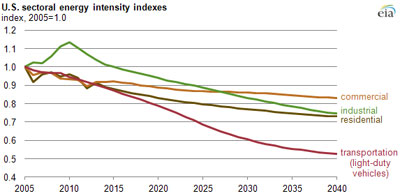American Electric Power says it is closing a dozen coal-fired power plants by the end of next year, taking off-line another 6.6 gigawatts (GW) of pollution burden in the US.
That brings the US total to 187 coal plants (78 GW) gone with 336 (265 GW) more to go, according to Sierra Club’s tracker.
Even better news is that the US economy is becoming more energy efficient, and those coal plants can be replaced with smaller energy sources, according to Black & Veatch’s Strategic Directions: US Electric Industry report.
About half of utilities plan to replace coal and nuclear plants with smaller gas plants that can also back-up renewable energy, says Black & Veatch. A third of utilities offer products like smart thermostats that further decrease energy demand.

Example: Florida Power & Light
The utility is actually buying a coal-fired power plant so it can shut it down. Why? Because it has a long-term contract to buy its energy, which can be supplied from FPL’s other resources.
Buying the 250 MW coal power plant for $520 million and then closing it will save customers about $70 million and eliminate 1 million tons of carbon emissions each year, says FPL.
Efficiency Cuts Midwest Electric Demand
In the Midwest, efficiency is cutting into electricity sales by almost 1% a year, says MISO, the regional grid operator – a sharp drop from previous projections for 1% growth in demand per year.
The 1.55% swing in MISO’s demand forecast is a milestone, Howard Learner, Executive Director of Environmental Policy and Law Center, told EnergyWire. "This isn’t a minor difference, it is big delta. We’re dealing with a structural change that fundamentally affects decisions for owners of power plants, state utility commissions and the Federal Energy Regulatory Commission."
Many utilities thought demand would rebound after the recession, but it hasn’t. State efficiency policies and a wave of federal appliance standards are permanently driving down energy use in residential, retail and industrial sectors.
New standards have been issued for residential appliances: light bulbs, stoves and microwaves, residential clothes washers and dishwashers, clothes dryers, refrigerators, central air conditioners and furnaces. On the commercial side, they apply to motors (which consume about half of industrial electricity) and vending machine equipment, for example.
President Obama’s goal is for efficiency standards to cut 3 billion metric tons of carbon emissions by 2030 – and the US is already two-thirds of the way there. The electricity saved already adds up to total US consumption in 2012!
"Energy efficiency is not a sideshow anymore, it is part of how utilities meet demand, Rebecca Stanfield at the Natural Resources Defense Council, told EnergyWire. And it will put more pressure on marginal coal and nuclear plants, because this keeps electric prices low.
And utility programs to increase energy efficiency are cheap at 4.4 cents per kilowatt-hour, compared to 9.5 cents for coal-fired electricity, according to Lawrence Berkeley National Lab.
And utilities pay only about half of those efficiency costs – program administration, marketing and rebates – while customers pay the other half to install efficiency upgrades like insulation.
Clearly, this is the tip of the melting iceberg for efficiency and we’re already seeing huge beneficial impacts … except for utilities, which have the nerve to say "efficiency programs aren’t cost-effective."
Read our articles, US Consumed Less Energy Last Year Than in 1999 and Efficiency Boom Will Cut US Electricity Demand 14% by 2035.
Read which states are currently working on rolling back efficiency and renewable energy programs:


 Loading...
Loading...
Government raises appliance standards but won’t tackle the issue head on and lower allowed emissions. It won’t sue polluters, fine them enough to matter, or arrest or jail manager making the decisions to pollute innocent people. Why? Nor will government quit subsidizing utilities, quit providing them with tax breaks. Why? We must make all businesses behave responsibly if we want the market to work right. If we want competition and the garage inventors to drive the conversion to clean energy, then government must quit taking the side of dirty energy and start doing an excellent job of defending our right to a healthy planet (and to share of Earth’s worth). More at Progress.org.